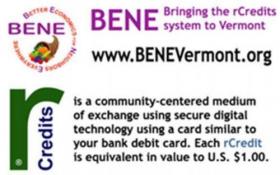
The Vermont BENE Group (Better Economics for Neighbors Everywhere) has been meeting in Brattleboro since January to discuss and plan for bringing the rCredits alternative currency to Vermont.rCredits is an online exchange of credits that can be spent instead of dollars at participating businesses or for making payments to other participating individuals. It has been operating successfully in the Greenfield Massachusetts area since the Fall of 2013.
The credits can be earned and spent locally, which encourages local circulation thus stimulating the local economy. In addition, both businesses and individuals receive incentive bonuses rewarding use of the system.
The rCredits system uses a secure, online accounting system to manage the exchange of credits. Individuals open an account, much like a bank account, and receive a picture ID called an “rCard”. After loading your account with some rCredits (purchased 1 for 1 with U$ dollars) you can use the “rCard” like a debit card at participating businesses, or to make payments to other individual members.
The system is accessed online or using a Smartphone app, and all the necessary hardware to scan rCards is provided free of charge to participating businesses.
The group is holding a series of open-to-the-public meetings to further explain rCredits and invites all interested individuals and business owners to attend. The next session will be held on Tuesday (August 11) in the Brooks Library meeting Room at 7 PM.
Vermont residents can join the rCredits network already, under the umbrella of the Greenfield group, but a separate BENE Vermont group (which will democratically control its own common good fund) is launching in the Fall of 2015.



Today's NYT on artisanal
Today’s NYT on artisanal cash. http://www.nytimes.com/2015/08/09/fashion/change-for-a-bowie-the-advent-of-artisanal-cash.html
A lot more convincing and cool than rCredits at first glance, which could some branding work. And look at how great the cash looks, gorgeous.
Are rCredits a response to local competitor BerkShares Inc? http://www.berkshares.org/
I’ll stick with bitcoin for now if I’m going to take a chance on a new currency. Can’t make the meeting but will be watching this. would be great to have an economist or someone that knows what they’re talking about do a peer review of this, especially at scale.
A local/regional issue
Bitcoin might be good for long distance currency, but I think these other efforts are attempts to get some additional local cash into the local economy. We could use an additional 10% or so, for sure, which are what these programs often offer.
Branding and buy-in are essential. This would be a good topic for those studying regional economic matters to discuss seriously.
Could you tie bit coin with a local currency in some way? Hmm…
Ok, it's a local debit card,
Ok, it’s a local debit card, at least I think it is. Why not go full paper and no digital?
A point to consider is that the bitcoin block chain might be able to have the 10% concept baked into each transaction. It’s 1,000 times more powerful than people realize, which is part of the problem.
I could go days in Boston, paying things with my phone, and that was several years ago. Digital Wallets are fantastic, but make a lot of people nervous about privacy.
Think about moving to the Euro and how easy it is to take money out of the ATM in one state and use it in another. You really want to see money fragmented like it was hundreds of years ago? That’s taking a step backwards to me.
You can’t use your money anywhere but Brattleboro. I guess that’s good for some people but I wouldn’t want to deal with multiple currencies. I want to go cashless, full electronic. I’m not a drug dealer so I don’t really care about paper money. And if armageddon happens, nobody is going to pay for anything with traditional money.
I’d like to know why the rCredits people decided that the other new currency in the Berkshires wasn’t the right solution for them.
Why would I need a picture ID if I have a smartphone? That makes no sense. Again, we’re going backwards here. And I’m definitely confused, more research needed.
Having to use dedicated hardware that each vendor has to maintain? An you need an expensive smartphone to use the system. I just think that in the end the 10% off doesn’t make much sense when you’ve spend $1,000 a year for a smartphone to use the system. Or maybe it does, its not clear, which is my problem.
They are replicating NYCE and the other transaction networks, with 10% off or whatever. Lots of credit cards have cash-back, that’s been a thing for several decades now.
I’m just pointing out all of the pain points here. Sure let’s do an end-run around the USD, I’m all for it.
We need more jobs in addition to more money. Create the jobs, the money will follow, regardless of which local money platform ends up working out.